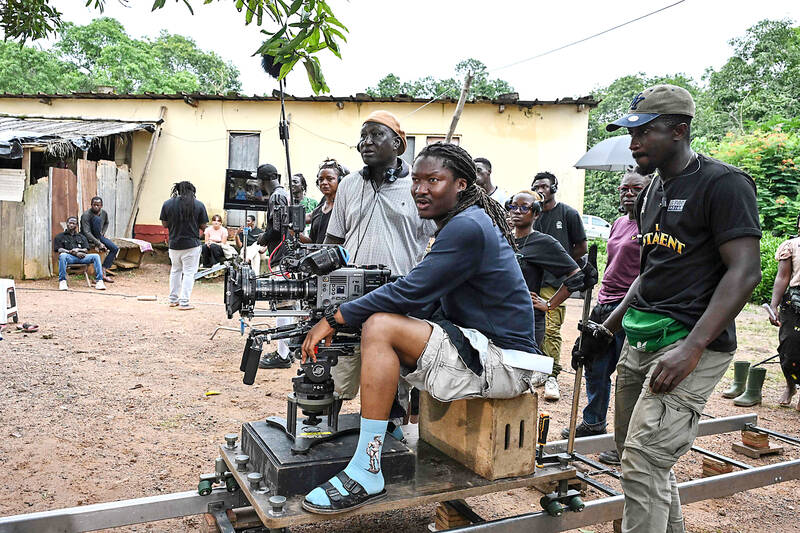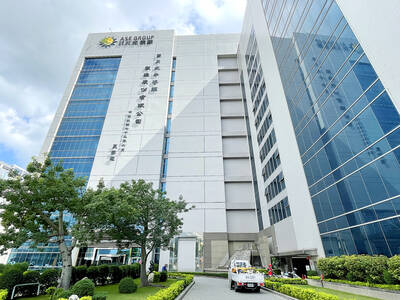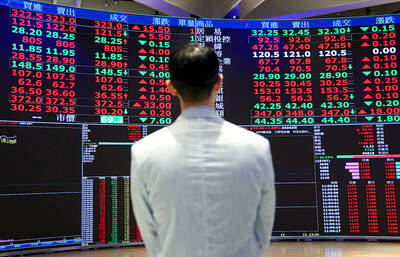In the lush forests north of Abidjan, technicians were busy filming on the set of Le Testament (“The Will”), a comedy coproduction between Ivory Coast, Burkina Faso and Senegal.
Under a large tree, village elders gathered to discuss the death of a wealthy local cocoa planter. In the film, his children return to their native village and bicker over his inheritance.
Ivory Coast is hosting an increasing number of local, pan-African and international productions, and is striving to establish itself as a go-to film destination in Africa in the face of longtime dominance by Nigeria’s thriving Nollywood.

Photo: AFP
According to the Ivorian culture ministry, about 30 films and television series were shot in the country last year. This year, 39 other projects have been approved.
Between takes of Le Testament, production manager Shaidate Coulibaly, 31, said there was a growing number of enthusiastic technicians and filmmakers.
“The sector’s really developing locally,” she said. “The new generation wants to tell stories about their daily life, stories that represent them.”
“We have people who are able to oversee an entire production without needing to look elsewhere,” said Adama Rouamba, the film’s Burkinabe director, who has witnessed first-hand how the sector has professionalized.
Ivory Coast, the world’s top cocoa grower and a regional economic powerhouse, is banking on its youth — 75 percent of the population is under 35 — to take its fledgling film sector to new heights.
However, Coulibaly said private investors were still “cautious,” and even though she received public funding, she had to fight to secure financing.
“The credibility of Ivorian cinema is building up bit by bit, but it’s a struggle,” she added.
The commercial capital Abidjan has been the backdrop of Franco-Ivorian director Philippe Lacote’s productions since he began his career in 2022.
Lacote just finished filming Clash — about rivalry between stars of the popular coupe-decale dance music — in Abidjan and the Congolese capital Kinshasa, using a predominantly Ivorian team.
“It wouldn’t have been possible a few years ago,” he said.
Ivory Coast Minister of Communication Amadou Coulibaly said the government was considering setting up specialized programs in schools and wants to “train all players in the film sector locally.”
At a major international convention in Abidjan recently, he said he wanted to make Ivory Coast “the hub of audiovisual content on the continent.”
The stakes are both economic and cultural, particularly with representations of Africa long dominated by Western countries.
Earlier this year, Franco-Ivorian director Jean-Pascal Zadi shot part of his movie Le Grand Deplacement here, while Eldorado, a series by Franco-American film producer Alex Berger, was filmed in the lush tropical Banco forest near Abidjan.
“It’s important for me to contribute to the development of Africa’s cultural industry. We need to produce our own stories, quality content,” said Zadi, calling local cinema a form of “soft power.”
His next film, an action movie, would also be shot in Ivory Coast.
At the Ivory Coast National Cinema Office, Adama Konkobo described last year as an “exceptional year” and estimated about 20 Ivorian films were screened.
In stark contrast, Nollywood — Nigeria’s massive and hugely popular film industry — released about 2,500.
Last year, Ivorian films made up for about 10 percent of screenings in the country and six percent of the box office.
Meanwhile, films produced or coproduced in the US accounted for 80 percent of the market share, according to the office.
“What’s missing in the development of local cinema is a clear vision from the authorities,” said Lacote, lamenting that the government is focusing on attracting foreign films without adequately financing Ivorian ones.
“It creates jobs,” he said. “But it doesn’t develop national cinema.”
Coulibaly insisted the political will was there, and highlighted a forthcoming “subsidy mechanism” aimed at young Ivorian talent.
Another obstacle to the development of a local film industry has been the country’s lack of cinemas, with only 15 movie theatres, nearly all of them in Abidjan.
A project to open a new cinema in Bouake in central Ivory Coast and the arrival last year of Pathe cinemas — a chain owned by a French film production and distribution company — in Abidjan could change the dynamic.

EXPANSION: The investment came as ASE in July told investors it would accelerate capacity growth to mitigate supply issues, and would boost spending by 16 percent ASE Technology Holding Co (ASE, 日月光投控), the world’s biggest chip assembly and testing service provider, yesterday said it is investing NT$17.6 billion (US$578.6 million) to build a new advanced chip packaging facility in Kaohsiung to cope with fast-growing demand from artificial intelligence (AI), high-performance-computing (HPC) and automotive applications. The new fab, called K18B, is to commence operation in the first quarter of 2028, offering chip-on-wafer-on-substrate (CoWoS) chip packaging and final testing services, ASE said in a statement. The fab is to create 2,000 new jobs upon its completion, ASE said. A wide spectrum of system-level chip packaging technologies would be available at

Taiwan’s foreign exchange reserves hit a record high at the end of last month, surpassing the US$600 billion mark for the first time, the central bank said yesterday. Last month, the country’s foreign exchange reserves rose US$5.51 billion from a month earlier to reach US$602.94 billion due to an increase in returns from the central bank’s portfolio management, the movement of other foreign currencies in the portfolio against the US dollar and the bank’s efforts to smooth the volatility of the New Taiwan dollar. Department of Foreign Exchange Director-General Eugene Tsai (蔡炯民)said a rate cut cycle launched by the US Federal Reserve

HEAVYWEIGHT: The TAIEX ended up 382.67 points, with about 280 of those points contributed by TSMC shares alone, which rose 2.56 percent to close at NT$1,400 Shares in Taiwan broke records at the end of yesterday’s session after contract chipmaker Taiwan Semiconductor Manufacturing Co (TSMC, 台積電) hit a fresh closing-high amid enthusiasm toward artificial intelligence (AI) development, dealers said. The TAIEX ended up 382.67 points, or 1.45 percent, at the day’s high of 26,761.06. Turnover totaled NT$463.09 billion (US$15.22 billion). “The local main board has repeatedly hit new closing highs in the past few sessions as investors continued to embrace high hopes about AI applications, taking cues from a strong showing in shares of US-based AI chip designer Nvidia Corp,” Hua Nan Securities Co (華南永昌證券) analyst Kevin Su

Nvidia Corp’s major server production partner Hon Hai Precision Industry Co (鴻海精密) reported 10.99 percent year-on-year growth in quarterly sales, signaling healthy demand for artificial intelligence (AI) infrastructure. Revenue totaled NT$2.06 trillion (US$67.72 billion) in the last quarter, in line with analysts’ projections, a company statement said. On a quarterly basis, revenue was up 14.47 percent. Hon Hai’s businesses cover four primary product segments: cloud and networking, smart consumer electronics, computing, and components and other products. Last quarter, “cloud and networking products delivered strong growth, components and other products demonstrated significant growth, while smart consumer electronics and computing products slightly declined,” compared with the